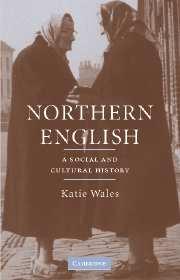Book contents
- Frontmatter
- Contents
- List of illustrations
- Preface
- List of abbreviations and symbols
- 1 ‘The North–South divide’
- 2 The origins of Northern English
- 3 Northern English and the rise of ‘Standard English’
- 4 Northern English after the Industrial Revolution (1750–1950)
- 5 Northern English present and future
- References
- Index of Northern English features
- General index
Preface
Published online by Cambridge University Press: 22 September 2009
- Frontmatter
- Contents
- List of illustrations
- Preface
- List of abbreviations and symbols
- 1 ‘The North–South divide’
- 2 The origins of Northern English
- 3 Northern English and the rise of ‘Standard English’
- 4 Northern English after the Industrial Revolution (1750–1950)
- 5 Northern English present and future
- References
- Index of Northern English features
- General index
Summary
It is a universal truth that we have no control over our place of birth but we live with the consequences for ever.
(Alan Plater, 1992: 71)This book is as much a personal journey, as it is a journey in time and space to discover the history of Northern English, itself a story of migrations, emigrations, travel and border-crossings. I was born at the end of the Second World War in Darlington, on the edge of County Durham separated from North Yorkshire by the River Tees. Midway between the glorious Dales and the sea-side, and poised in its dialect between ‘Geordie’ and Yorkshire English, Darlington was for me the origo, the still-point of my personal or ‘numinous map’, in York-born W. H. Auden's terms (1967: 830), of the North and its ways of speech. Salve magna parens. My family rarely ventured north of Newcastle, and Hadrian's Wall was a clear border: for Scotland was certainly perceived as being too far away and too cold, even for us Northerners. J.B. Priestley obviously had similar feelings: north of Newcastle he felt he was ‘marooned in Lapland’ (1934: 290). For the writer Beryl Bainbridge also, but on the other side of the Pennines, ‘the North stretched from Birmingham to Liverpool and then became Scotland’ (1987: 15). Rarely did we ourselves venture ‘over the top’, that is, over the Pennines, to the Lake District; and certainly Blackpool was out of bounds as being ‘common’.
- Type
- Chapter
- Information
- Northern EnglishA Social and Cultural History, pp. xi - xiiiPublisher: Cambridge University PressPrint publication year: 2006

